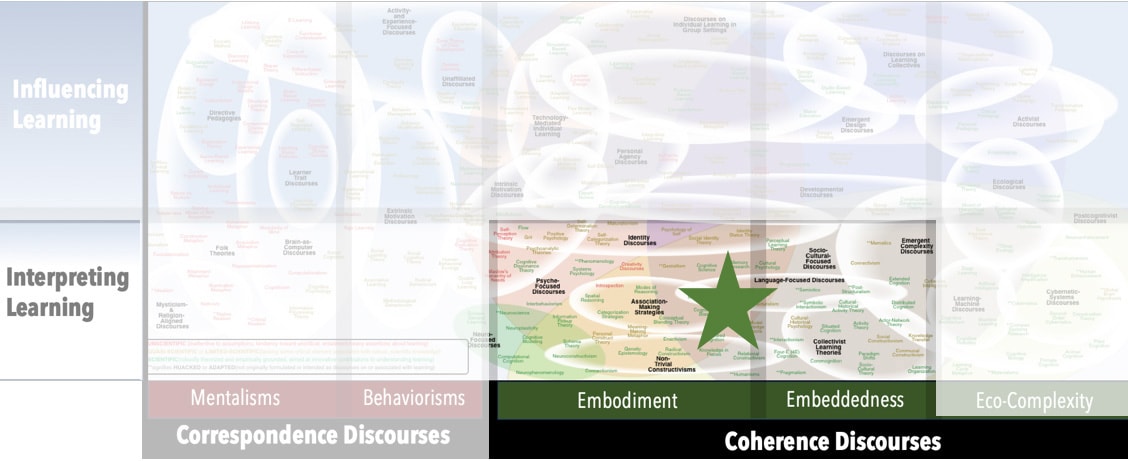Focus
Removing the divide between individual learning/development and cultural knowledge/developmentPrincipal Metaphors
- Knowledge is … scope of externalized actions and interpretations
- Knowing is … doing (i.e., appropriate action in a situation)
- Learner is … a cultural apprentice (socialized and enculturated individual)
- Learning is … participating in discourse (i.e., becoming proficient in a particular type of communication)
- Teaching is … modeling (i.e., acting as a more-expert agent while involving learners in culturally relevant experiences)
Originated
2000sSynopsis
Commognition is an education-focused articulation of Socio-Cultural Theory. The name is a mash-up of communication and cognition, used to signify the unity of external communication (dialogue with others) and internal cognition (self-talk). Commognition foregrounds the role of verbal language, attending in particular to the human capacity to talk about almost anything, including talk itself. That recursive function of language is seen as the source of unbounded innovation and ever-mounting complexity. Key subconcepts include:- Discourse – the ways of communicating that characterize a particular domain
- Endorsed Narratives – the stories or explanations people use to make sense of the world, particularly in a learning environment
- Mediating Artifacts – symbols, diagrams, graphs, and other tools that mediate communication and thinking
- Objectification – the process through which actions, processes, or discourses become reified, or turned into objects of thought
- Routines – recurrent patterns of communicative behavior or typical ways of engaging with problems
- Process–Object Duality Theory (Anna Sfard, 1990s) – the suggestion that cognitive constructs can be understood in two complementary ways – i.e., as dynamic processes/actions or as static, holistic entities. Preferably, both are available to the learner, depending on context. Three stages are posited in the transition from a Process to and Object:
- Interiorization – the automizing of a sequence of steps
- Condensation – experiencing an automized process as an autonomous entity
- Reification – coming to regard a condensed process as an stable, independent, object-like whole
Commentary
The principal contribution of Commognition has been an updating of the vocabulary of Socio-Cultural Theory, tailored especially for the issues and obligations associated with formal education. Beyond that, it offers little that hasn’t already been developed across other theories, particularly Second-Order Cybernetics.Authors and/or Prominent Influences
Anna SfardStatus as a Theory of Learning
Commognition is a Socio-Cultural Theory of learning.Status as a Theory of Teaching
Commognition is not a theory of teaching.Status as a Scientific Theory
Commognition meets our criteria for a scientific theory.Subdiscourses:
- Discourse
- Endorsed Narratives
- Mediating Artifacts
- Process–Object Duality Theory
- Reification (Concretism; Hypostatization; Objectification)
- Routines
Map Location

Please cite this article as:
Davis, B., & Francis, K. (2024). “Commognition” in Discourses on Learning in Education. https://learningdiscourses.com.
⇦ Back to Map
⇦ Back to List
